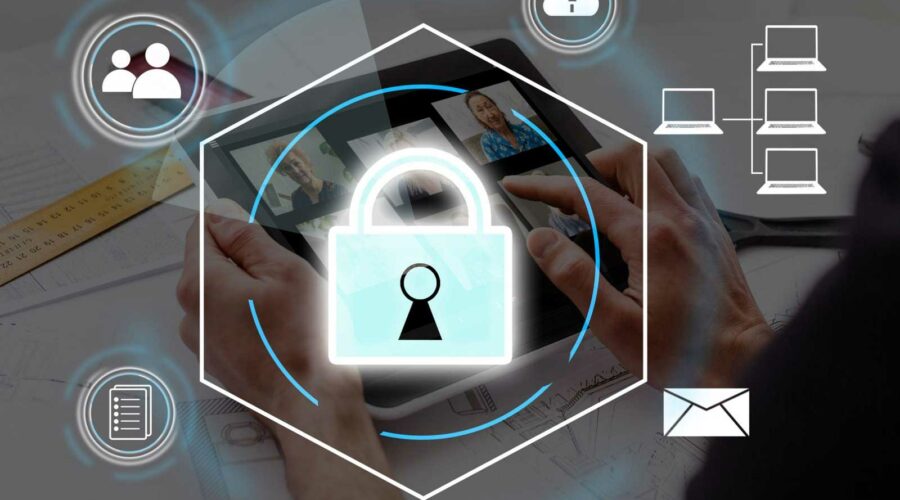Top cybersecurity practices for small businesses include implementing strong password policies, regularly updating software and systems, educating employees about phishing and other cyber threats, and regularly backing up data to protect against potential data breaches or attacks. These practices ensure a secure online environment for small businesses, safeguarding sensitive information and minimizing the risk of cyber incidents.
In today’s digital age, where cyber attacks are becoming increasingly sophisticated, it is crucial for small businesses to prioritize cybersecurity to protect their operations, reputation, and customer trust. By adopting these best practices, small businesses can bolster their defenses and stay one step ahead of cybercriminals.

Credit: www.ais-now.com
Understanding The Cybersecurity Threat Landscape
Understanding the ever-evolving cybersecurity threat landscape is crucial for small businesses. In today’s digital age, the importance of cybersecurity cannot be overstated. Small businesses are increasingly vulnerable to cyber threats, which can have devastating effects on their operations. Common types of cyber threats include malware, phishing, ransomware, and data breaches.
These attacks can result in significant financial losses, damage to reputation, and loss of customer trust. Small businesses often lack the resources and expertise to effectively protect themselves against cyber threats, making them attractive targets for hackers. It is essential for small businesses to prioritize cybersecurity measures such as implementing strong firewalls, regularly updating software, training employees on best practices, and regularly backing up data.
By taking proactive steps to safeguard their systems and data, small businesses can mitigate the impact of cyber attacks and ensure the continuity of their operations.
Essential Cybersecurity Measures For Small Businesses
Small businesses must prioritize cybersecurity by conducting regular risk assessments. This involves identifying potential vulnerabilities and addressing them promptly. Implementing strong passwords and multi-factor authentication is crucial for protecting sensitive data. These measures prevent unauthorized access and reduce the risk of data breaches.
Furthermore, training employees on cybersecurity best practices is essential to create a security-conscious culture. This empowers employees to recognize and respond to potential threats effectively. By consistently updating security measures and educating staff on the latest threats, small businesses can significantly reduce the risk of cyberattacks and safeguard their valuable assets.
Staying proactive in adopting cybersecurity practices is the key to preventing potential security breaches and maintaining the trust of both customers and stakeholders.
Securing Business Networks And Systems
Securing your business networks and systems is crucial for small businesses in today’s digital world. Keeping your software and systems up to date is the first step towards strong cybersecurity. By regularly installing updates, you can protect your business from emerging threats and vulnerabilities.
Another important practice is to install firewalls and use secure wi-fi networks. Firewalls act as a barrier between your network and potential threats. Using secure wi-fi networks with strong passwords adds an extra layer of protection. Additionally, encrypting sensitive data is essential.
Encryption ensures that even if data is intercepted, it cannot be read without the encryption key. Finally, using secure cloud storage for your business data provides a secure backup option and protects against data loss or theft. Implementing these cybersecurity practices will help safeguard your small business from cyber threats.
Protecting Against Malware And Phishing Attacks
To protect against malware and phishing attacks, small businesses should prioritize installing and regularly updating robust antivirus software. They must also educate themselves and their employees about recognizing and avoiding phishing emails and suspicious attachments. Another key practice is to regularly back up important data to prevent falling victim to ransomware attacks.
These cybersecurity measures are crucial for ensuring the safety and integrity of sensitive business information. By implementing these practices, small businesses can strengthen their defenses against cyber threats, safeguard their operations, and maintain the trust of their customers. Prioritizing cybersecurity is essential in today’s digital landscape, where cybercriminals continually evolve their tactics to exploit vulnerabilities.
By staying vigilant and proactive, small businesses can minimize the risks associated with cyber threats and protect their valuable assets.
Safeguarding Against Insider Threats
Small businesses face significant cybersecurity threats, including insider threats. To safeguard against such risks, it is crucial to implement access controls and user permissions. This helps ensure that only authorized individuals have access to sensitive information and systems. Conducting background checks on employees can also help identify any potential risks during the hiring process.
Additionally, monitoring and auditing user activities allows businesses to track any unusual or suspicious behavior. By staying vigilant and proactive in implementing these practices, small businesses can mitigate the risk of insider threats and protect their valuable assets from unauthorized access or malicious actions.
Such cybersecurity measures are essential to maintaining the privacy and security of sensitive data within the organization.
Securing Mobile Devices And Remote Work
With the increasing prevalence of mobile devices and remote work, small businesses need to prioritize cybersecurity. By implementing mobile device management solutions, companies can ensure that devices are secure and data is protected. Encouraging employees to use secure wi-fi networks adds an extra layer of protection, minimizing the risk of unauthorized access.
Additionally, setting up policies for secure remote work establishes guidelines and expectations for employees, promoting a secure work environment. By following these practices, small businesses can enhance their cybersecurity measures, safeguarding sensitive information and minimizing the potential for cyber threats.
Stay proactive and prioritize security to ensure the safety of your business and its valuable data.
Creating A Cybersecurity Incident Response Plan
Creating a cybersecurity incident response plan is crucial for small businesses. It involves developing a step-by-step plan for responding to cyber incidents. This plan should be regularly tested and updated as needed. Additionally, establishing communication channels and contacts for reporting incidents is essential.
Small businesses should ensure that they have a well-defined process in place to handle cybersecurity incidents effectively. By following these practices, businesses can minimize the potential impact of cyber threats and protect their sensitive data. Being proactive and prepared is key in today’s digital landscape where cyber threats are constantly evolving.
Engaging Cybersecurity Professionals And Services
Engaging cybersecurity professionals and services is crucial for small businesses. Hiring cybersecurity consultants or firms with specialized expertise can provide valuable assistance. Small businesses can also outsource certain security functions like vulnerability testing to ensure comprehensive protection. Partnering with managed security service providers (mssps) offers the benefit of 24/7 monitoring and rapid response to potential threats.
By utilizing these practices, small businesses can strengthen their cybersecurity posture and effectively safeguard their sensitive data. It is essential to prioritize cybersecurity measures, as even a single security breach can have severe consequences for small businesses. With the increasing sophistication of cyber threats, taking proactive steps and leveraging professional services becomes paramount to ensure the safety and continuity of operations.
Frequently Asked Questions Of Top Cybersecurity Practices For Small Businesses
What Are The Top Cybersecurity Practices For Small Businesses?
Implementing strong passwords, regularly updating software, and providing cybersecurity training for employees are essential practices for small businesses to protect against cyber threats. Additionally, using encryption for sensitive data and regularly backing up information can safeguard against data loss.
How Can Small Businesses Protect Against Phishing Attacks?
Small businesses should educate employees about phishing scams, encouraging skeptical behavior toward suspicious emails and links. Implementing email filters and spam protection, and regularly updating antivirus software can also help prevent phishing attacks.
What Is The Role Of Employee Training In Small Business Cybersecurity?
Employee training is crucial in small business cybersecurity. It educates employees about recognizing and preventing cyber threats, promoting safe online practices, and minimizing the risk of data breaches. Training programs should cover topics such as password security, phishing awareness, and safe browsing habits.
Conclusion
In a digital landscape filled with evolving threats, it is crucial for small businesses to prioritize cybersecurity. By implementing the top practices mentioned in this blog post, your business can significantly reduce the risk of cyberattacks and protect sensitive data.
Remember to regularly update and patch all software and systems, use strong and unique passwords, and enable two-factor authentication for added security. It is also important to educate and train your employees on cybersecurity best practices and encourage a culture of vigilance.
Additionally, consider investing in a reliable cybersecurity solution that caters to the unique needs of your small business. By taking these proactive steps, you can safeguard your business from potential breaches and establish trust with your customers. Stay ahead of cyber threats and ensure the longevity and success of your small business.





